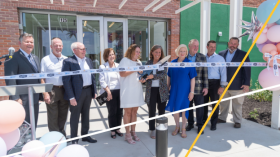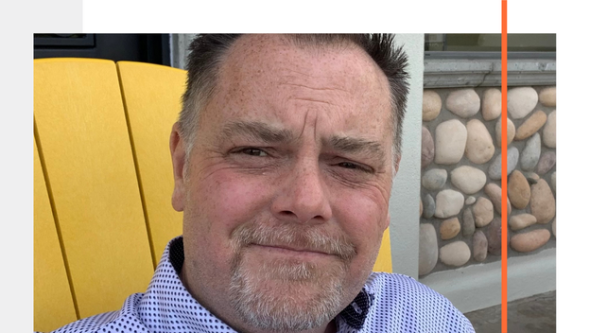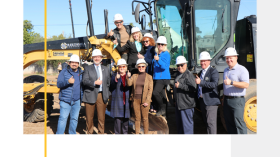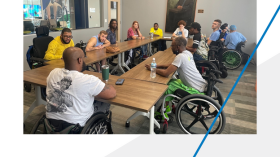
Advisory Board Member: Joe Keeper
Role/Organization: Director of Real Estate Development for Native American Connections, an organization offering a continuum of behavioral health, affordable housing and community development services for more than 10,000 individuals and families annually in and surrounding the urban core of Phoenix, Arizona.
About: Since 2002, Keeper has led his organization in all phases of project management and operations for community development projects. In addition to his expertise as a developer, Keeper is an advocate of a holistic approach to community and economic development, and is dedicated to helping low-income and disadvantaged people obtain the support network and wraparound services to improve their chances of success.
On EFCDE’s board since: 2008
Q: The New Markets Tax Credit (NMTC) program not only benefits qualifying businesses but also the communities they serve. How would you describe the broader impacts of NMTC investments to economically distressed communities?
What immediately comes to mind for me are those outcomes that are referred to as the ‘social determinants of health’ — improving the conditions where people live and work that affect the overall health and quality of life of residents in those communities. Those factors can be education, healthcare, social support networks, etc. We’ve been thinking through this [in our organization] for the past fifteen years. I’m a numbers guy, and I find this framework provides the ability to speak about the impacts at both the community level — who we serve — and demonstrates impact on the business and economic side as well.
Q: As a real estate developer yourself, you’ve been able to see firsthand how NMTC can bring real value to projects and communities. What might you want to share to those who need to navigate its complexities or expenses for the first time? Are the tax credits worth the effort?
The industry itself fights a general reputation for being overly complex or expensive to close deals.
Perhaps I am immune to it, but to me, it’s straightforward, and I don’t think closing NMTC deals is any more expensive or complicated than other commercial financing. I’d say 85 percent of the documentation process consists of real estate documents and follows the same due diligence as other real estate projects; the last 15 percent of the documentation requirements have more to do with your guiding and corporate principles, which speak to who you are as an organization — whether you are a nonprofit or for-profit; a service agency or not.
Plus, with NMTC, there is a double bottom line. We all still have to make business decisions that make sense for us financially, but going back to that final 15 percent —that’s the mission of an organization and who we are serving. The tax credits provide a vehicle or mechanism to help us get there, serve more clients, and serve them perhaps in better facilities, better locations or in a more approachable way.
Q: That last 15 percent that differentiates an NMTC project — could that make a difference on how developers, business owners and others perceive the complexity of an NMTC deal or what it takes to navigate the transaction?
It could be. I think that’s where EFCDE really excels — the better your banker knows your business model, the easier it is for them to help to meet your long-term goals as an organization, whatever those are. I also feel that for those smaller organizations or those lacking traditional credit, there is more understanding and sensitivity around who you are planning to serve and what models you are using beyond the traditional profit and loss ledger systems. They see what a traditional banker is not able to look at. To me, that is how the New Markets program provides a little more flexibility.
Another big advantage is that EFCDE also offers the leverage equity piece if that’s needed and desired, and that helps you as a developer or owner.
Q: What advice do you have for those considering NMTC for their projects?
NMTC helps projects get across the finish line — no doubt. Businesses or organizations that would not have access to affordable credit might not have the upfront capital resources from a loan-to-value traditional sizing standpoint but fit that general bottom-line social purpose — those should always be evaluating NMTC in their financing mix. It might come down to a cost of capital issue or equity requirement — those could be determining factors why someone would go that route or not, but I would always evaluate all scenarios.
Understanding that there is a way to use your capital and use your balance sheet to grow your services does work. But the deal has to work, and it has to work over seven years, and transition to conventional financing if needed after that to operate as a going concern that again, can meet that “double bottom line.” It does have a learning curve at first, especially for those smaller, grassroots organizations, but you’ve got to find creative solutions on both sides and find a way to get the project done to continue those services that are so desperately needed. You’ve got to roll up your sleeves — and we need everyone to do that. If it were easy, it would already be done. There would be no need for these types of programs; that’s why they’re there.
Q: As a member of Enterprise Financial CDE’s Advisory Board, you play a key role in reviewing the details of projects funded through NMTC, representing the voice and needs of the populations we serve. What have you learned or what do you value about your contribution to the EFCDE Advisory Board?
As one of the EFCDE Advisory Board members, I see and refer projects that could benefit from New Markets investments, but the EFCDE team is always hard at work, making it very easy for our group of advisory board members to assess potential projects to ensure they will benefit their communities in the way the project is intended.
I am always learning from seasoned veterans on the board and from those who bring a range of other ideas, viewpoints and expertise. We have a good mix from other regions and those who have been through much more than I have been, and I appreciate their expert advice. It gets you excited to continue to do more, and there’s so much need, so much demand for finance.
Personally, to feel like you can make a difference as human beings who share a common goal and passion — that’s the value I see.


